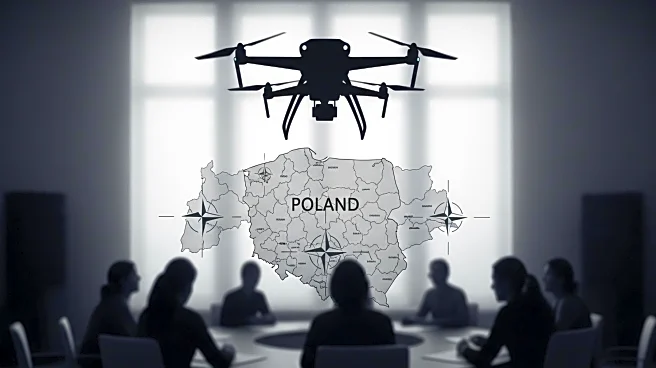What's Happening?
NATO allies have initiated consultations under Article 4 of the NATO treaty following a Russian drone incursion into Polish airspace. This development marks a significant escalation in the ongoing conflict between Russia and Ukraine, as it is the first time a NATO country has been directly involved in military action since the full-scale invasion of Ukraine began in 2022. On Tuesday night and early Wednesday morning, 19 Russian drones entered Polish airspace, prompting the Royal Netherlands Air and Space Force to scramble F-35 fighter jets to intercept them. The German defense minister, Boris Pistorius, stated that the drones were deliberately set on this course and did not need to fly this route to reach Ukraine. The incident has raised concerns about the potential for the conflict to spill over into neighboring NATO countries, testing the alliance's resolve and political will.
Why It's Important?
The incursion of Russian drones into Polish airspace represents a significant test of NATO's resolve and political will. It highlights the potential for the conflict in Ukraine to escalate and affect neighboring countries, which could have broader implications for European security and stability. The incident suggests that Russia may be attempting to drive a wedge between Ukraine, Europe, and the United States, potentially exploiting any differences in response among NATO allies. The consultations under Article 4 are crucial as they could lead to more urgent actions, including invoking Article 5, which considers an attack on one member as an attack on all. This situation underscores the importance of NATO's collective defense strategy and the need for coordinated responses to external threats.
What's Next?
Poland's request for NATO to activate Article 4 consultations indicates the seriousness of the situation. These consultations could lead to increased support for Poland, including enhanced air defenses and patrols in the Nordic-Baltic region. NATO members may also consider moving warships as a signal to Russia to back off. The White House has stated that President Trump will speak to Poland's president, and the US ambassador to NATO has reiterated support for Warsaw. The outcome of these consultations will be closely watched, as they could influence NATO's future actions and the alliance's approach to handling similar provocations.
Beyond the Headlines
The drone incursion into Polish airspace raises questions about Russia's broader strategy and its perception of NATO's commitment to defending its members. The incident may suggest that Russia believes US support for Ukraine is faltering, potentially emboldening it to test NATO's resolve further. The situation also highlights the ongoing geopolitical dynamics and the challenges of maintaining unity among NATO allies in the face of external threats. The consultations under Article 4 could lead to discussions about strengthening NATO's defense capabilities and addressing vulnerabilities in the alliance's eastern flank.









